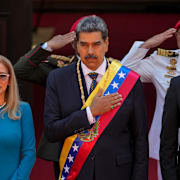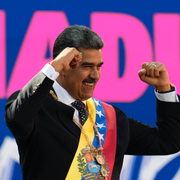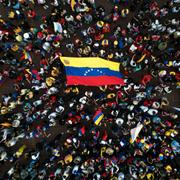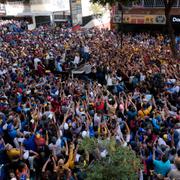
Venezuela skapar digital valuta mot USA:s blockad
Venezuelas president Nicolas Maduro meddelade i ett tv-sänt tal på söndagen att landet ska skapa en digital valuta för att bekämpa USA:s ekonomiska blockad av landet, skriver AFP.
Valutan kommer att heta Petro och backas av landets olje-, gas- och diamanttillgångar.
– Det här kommer att låta oss att gå vidare mot nya former av finansiering av landets ekonomiska och sociala utveckling, sa Maduro i talet enligt nyhetsbyrån.
bakgrund
Venezuelas ekonomi
Wikipedia (en)
The economy of Venezuela is largely based on the petroleum sector and manufacturing. Revenue from petroleum exports accounts for more than 50% of the country's GDP and roughly 95% of total exports. Venezuela is the sixth largest member of OPEC by oil production. From the 1950s to the early 1980s, the Venezuelan economy experienced a steady growth that attracted many immigrants, with the nation enjoying the highest standard of living in Latin America. During the collapse of oil prices in the 1980s, the economy contracted the monetary sign, commenced a progressive devaluation, and inflation skyrocketed to reach peaks of 84% in 1989 and 99% in 1996, three years prior to Hugo Chávez taking office.
Venezuela manufactures and exports heavy industry products such as steel, aluminum , and cement. Production is concentrated around Ciudad Guayana, near the Guri Dam, one of the largest dams in the world and the provider of about three-quarters of Venezuela's electricity. Other notable manufacturing includes electronics and automobiles as well as beverages, and foodstuffs. Agriculture in Venezuela accounts for approximately 3% of GDP, 10% of the labor force, and at least one-fourth of Venezuela's land area. Venezuela exports rice, corn, fish, tropical fruit, coffee, pork, and beef. The country is not self-sufficient in most areas of agriculture.
In spite of strained relations between the two countries, the United States has been Venezuela's most important trading partner. U.S. exports to Venezuela have included machinery, agricultural products, medical instruments, and cars. Venezuela is one of the top four suppliers of foreign oil to the United States. About 500 U.S. companies are represented in Venezuela. According to Central Bank of Venezuela, between 1998 and 2008 the government received around 325 billion USD through oil production and exports in general.[17] Also, according to the International Energy Agency, as of August 2015 the production of 2.4 million barrels per day supplied 500,000 barrels to the United States of America.[18]
Since Hugo Chávez's "socialist revolution" half-dismantled its PDVSA oil giant corporation in 2002 by firing most of its 20,000-strong dissident professional human capital, and imposed stringent currency controls in 2003 in an attempt to prevent capital flight, there has been a steady decline in oil production and exports and a series of stern currency devaluations, disrupting the economy. Further yet, price controls, expropriation of numerous farmlands and various industries, among other disputable government policies including a near-total freeze on any access to foreign currency at reasonable "official" exchange rates, have resulted in severe shortages in Venezuela and steep price rises of all common goods, including food, water, household products, spare parts, tools and medical supplies; forcing many manufacturers to either cut production or close down, with many ultimately abandoning the country, as has been the case with several technological firms and most automobile makers. In 2015, Venezuela had over 100% inflation – the highest in the world and the highest in the country's history at that time. The rate increased to 800% in 2016 with Venezuela spiraling into hyperinflation while the population poverty rate was between 76% and 82% according to independent sources.
On 14 November 2017, credit rating agencies declared that Venezuela was in default with its debt payments, with Standard & Poor's categorizing Venezuela as being in "selective default".
Omni är politiskt obundna och oberoende. Vi strävar efter att ge fler perspektiv på nyheterna. Har du frågor eller synpunkter kring vår rapportering? Kontakta redaktionen



